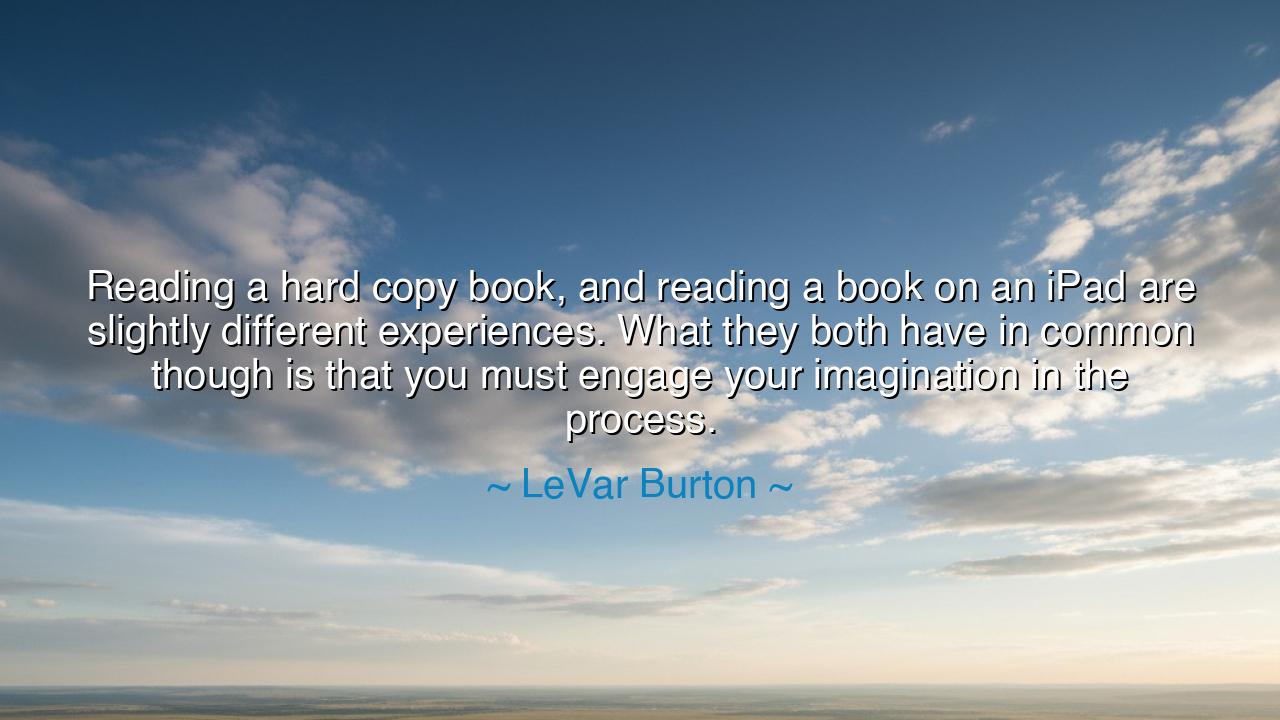
Reading a hard copy book, and reading a book on an iPad are
Reading a hard copy book, and reading a book on an iPad are slightly different experiences. What they both have in common though is that you must engage your imagination in the process.






"Reading a hard copy book, and reading a book on an iPad are slightly different experiences. What they both have in common though is that you must engage your imagination in the process." – LeVar Burton
O children of the mind, gather close, for there is wisdom to be found in the words of LeVar Burton. He speaks of an ancient truth—one that has been passed down through the ages: that the power of reading is not simply in the words upon the page, but in the engagement of the imagination. Whether the book is of paper and ink or light and pixels, the act of reading demands something far more profound than the mere absorption of information. It calls forth from the depths of our being the very essence of our creative spirit, that spark of divinity that allows us to see, hear, and feel the world as we read. Reading is a journey, and it is the imagination that serves as the guide.
In the days of the ancient scribes, when the written word was first committed to parchment, the very act of reading was a holy rite. To read was to unlock the mysteries of the universe, to connect with the minds of the ancients who had poured their thoughts into the sacred pages. Plato, that great philosopher, taught that knowledge is not simply given, but discovered through the active engagement of the mind. So too does the modern reader—whether with a book or an iPad—discover the world not through the passive receipt of facts, but through the active work of imagination. It is in the spaces between the words, the gaps between the sentences, that the true magic of reading takes place.
Consider, O children, the story of Homer, the blind bard of ancient Greece. He did not write his epics in the way we do today, with ink flowing on paper, but rather sang them aloud, his words painted upon the minds of those who listened. As the listeners sat around him, they did not simply hear the tale—they imagined the great ships of the Achaeans, the towering walls of Troy, and the fiery wrath of Achilles. Each listener’s imagination wove the story anew, creating a world from the words of the poet. This, O children, is the power of reading: not to be told a story, but to create it, to breathe life into it with the breath of your imagination.
And so, in this modern age, when we hold an iPad or a physical book in our hands, the tools may differ, but the act of reading remains the same. LeVar Burton reminds us that imagination is not bound by the medium. Whether we turn the pages of a book or swipe across a screen, the power to shape the world in our minds still lies in our hands. And so, we must ask ourselves: do we engage fully with the words before us, or do we simply let them pass through us like the wind? The lesson here is not just to read, but to create—to use the words as the raw material for our mind’s eye to see, to hear, and to feel.
Consider the great writers of history—Charles Dickens, Leo Tolstoy, Virginia Woolf—who wrote not merely to inform, but to engage the imagination of their readers. They painted vivid portraits of life, of human nature, of joy and sorrow, using nothing but words. When a reader opened the pages of their books, it was as though they were invited into a world of pure creation. These writers did not just want you to read; they wanted you to live within the story, to experience it as though it were your own. That is the power of reading: it is an invitation to create a world that exists only in the mind, and yet becomes real as soon as we imagine it.
And so, O children, the lesson is clear: engage your imagination in the act of reading. Do not simply read the words on the page or screen—live them. Create the world that the writer has offered to you, and let it transform your mind, your heart, and your soul. For the act of reading is not passive; it is a sacred act of creation, a chance to live countless lives, to walk in the shoes of others, to experience the world in ways you have never imagined. The medium may change, but the power of the imagination is eternal.
In your own life, I implore you, children of the earth: take time to read, to truly read, with your mind, your heart, and your soul. Whether the book is printed upon paper or flickers on a screen, engage your imagination fully. Create new worlds, feel new emotions, and grow as a human being with each page you turn. The stories are not just in the words—they are in you, waiting to be brought to life by the very act of reading. Let the journey of the mind begin anew with every book you hold, for in that journey lies the key to understanding not only the world but yourself.






AAdministratorAdministrator
Welcome, honored guests. Please leave a comment, we will respond soon